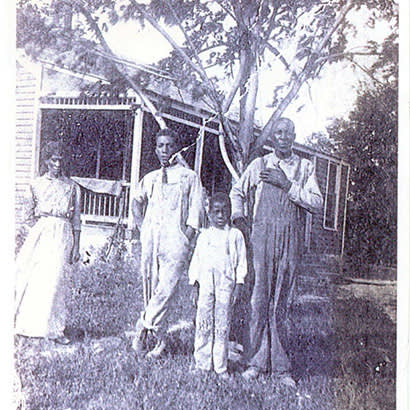
For an enhanced digital experience, read this story in the ezine.
Michael Pearl is a fifth-generation farmer and the owner of Pearl Family Farm in Platte County, Missouri. He regularly attends the Overland Park Farmers’ Market in Overland Park, Kansas.
In 1813, Michael’s great-great-grandfather, Milton Paxton, was born an enslaved man in Kentucky and was a farm laborer for the Paxton family. Around 1839, Milton was relocated to Platte County, Missouri, with this slave owner to work on the new hemp plantation, but he had dreams of owning his own land someday. Milton won his freedom and changed his last name to Pearl.
Milton Pearl had a son, named David, who also was born into slavery in 1852 and worked on the hemp plantation. David eventually was freed as well by exceeding his mandated duties. At that time, it was common for slaves to make extra money by exceeding their quota of cutting and bundling hemp.
David, Michael’s great-grandfather, worked hard enough that he saved enough money to buy 87 acres of land in 1890. This land has remained in agricultural production for more than 130 years, following the traditions and ambitions of Michael’s ancestors.
Although Michael grew up farming, he attended the University of Kansas on a football scholarship and graduated with a degree in advertising. He spent years working in New York and with other large companies throughout the country. He met his wife, Margarita, while living in New York City. Eventually, his work led him back to Kansas City, Missouri, and to his family’s land.
Though he continued his corporate advertising work, being back on the land felt right since farming is embedded in his DNA, he says. Soon he began to plant vegetables for his family and friends. Before he knew it, his hobby of planting a few crops blossomed into a thriving business.
A Community Leader
When not in his fields, Michael serves as an active community leader and mentor, sitting on several boards, organizations and initiative projects throughout the Kansas City metro area that not only support local agriculture, but also food access in the community. He partners with multiple food distribution hubs that ensure fresh produce is available within church pantries, food banks and inner-city neighborhoods where resources are scarce, also known as “food deserts.” As Michael thinks about his legacy, he now focuses on how to feed the hungry, grow foods to help sustain everyone’s overall health and longevity, and protect the soil and climate.
As we approach Juneteenth, Michael reflects on this holiday and is thankful that his ancestors made it through the Middle Passage — the “forced voyage of enslaved Africans across the Atlantic Ocean to the New World” — and carved out a life in a new country that was not made for them. “It uplifted our ancestors and began the process of truly realizing the words written in our Constitution.”
A few years ago, the Anti-Racist Farmers Market Toolkit was created to help farmers and market managers make progress toward becoming anti-racist managers of anti-racist markets. According to Michael, this is a tool to help navigate and counsel on those issues, and he believes we should use whatever we can to help us all do the best we can.
“Our market might be the most diverse workplace that I have ever worked in,” Michael says. “I sell produce, and we simply concentrate on being the best and delivering a high level of customer service.”
Kristina Stanley is Farmers’ Market Manager at City of Overland Park, Kansas.


